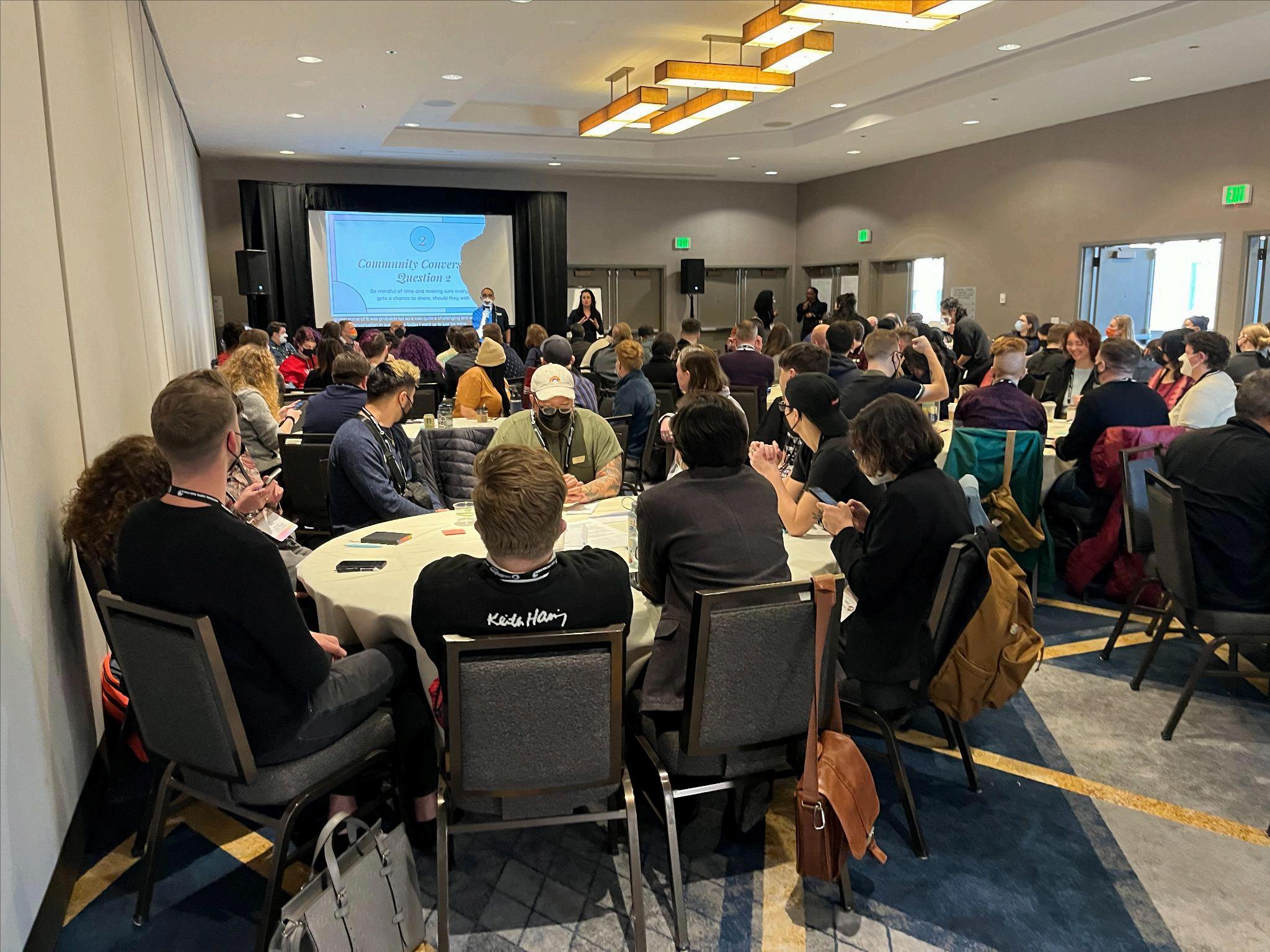




Vision: We envision higher education environments where LGBTQIA2S+ people, inclusive of all of our intersecting identities, are fully liberated
Mission: The Consortium of Higher Education LGBT Resource Professionals is a member-based organization working towards the liberation of LGBTQIA2S+ people in higher education We support individuals who work on campuses to educate and support people of diverse sexual orientations and gender identities, as well as advocate for more inclusive policies and practices through an intersectional and racial justice framework.
The Consortium does this through:
● Education: Monthly webinars, day-long institutes, and developing guidance centered on best and promising practices in specific areas that affect LGBTQ+ communities
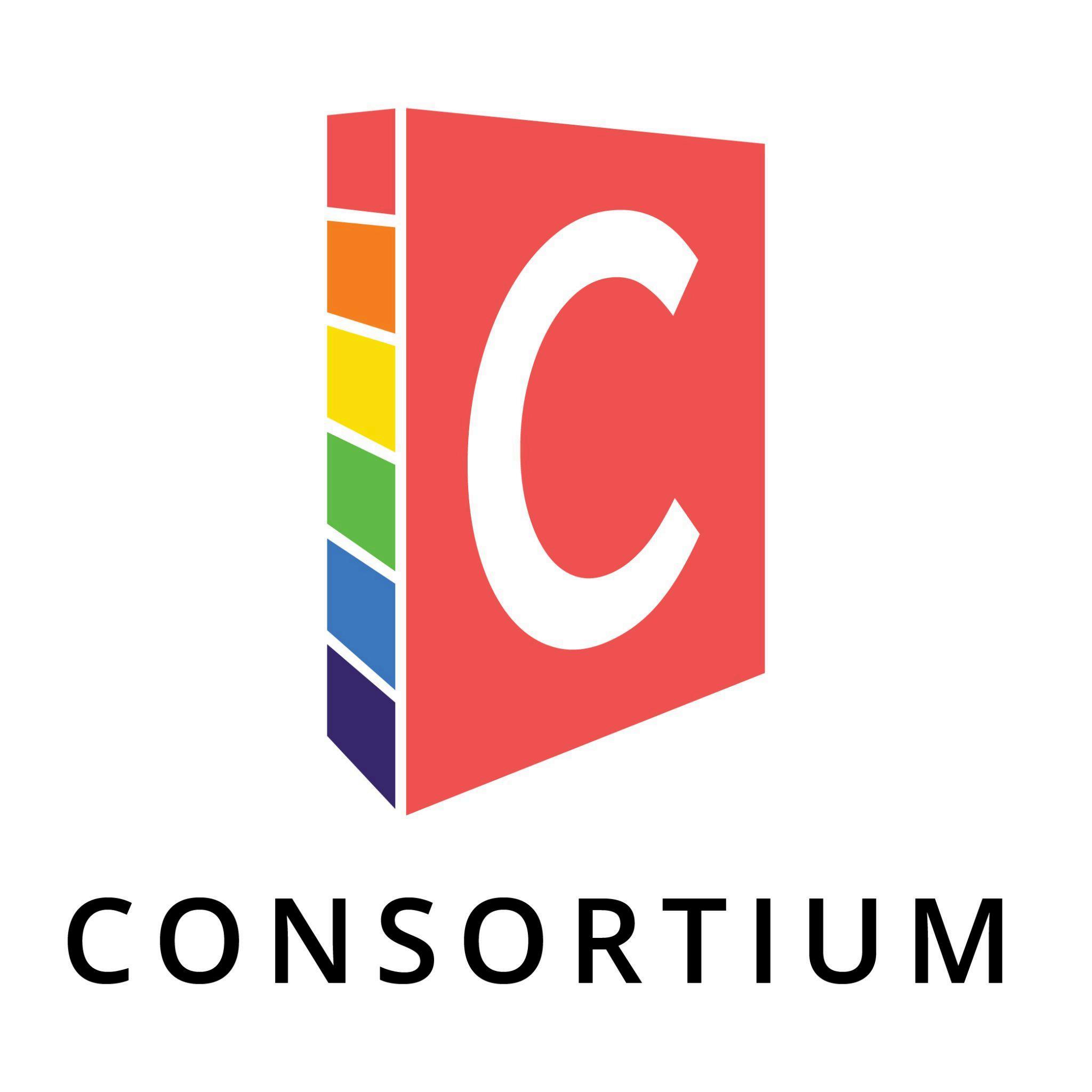
● Empowerment & Support: Cultivating inter-generational networks, relationship-building within Consortium constituency groups, and providing support for Queer and Trans People of Color (QTPOC) at every stage of the path of becoming a campus LGBTQIA2S+ resource professional
● Collaborative Engagement: Connecting with higher education institutions and other organizations with missions relating to advocacy for LGBTQIA2S+ communities or creating more just and inclusive colleges and universities
Land Acknowledgement
As higher education LGBTQIA2S+ practitioners committed to a racial justice framework in our work, we recognize that settler colonialism, anti-Blackness and white supremacy are imbricated in our current educational structures. These systems of power directly influence how we understand and view gender and sexuality today.
We also understand the limits of how land acknowledgements are used and framed in higher education. Therefore, we are committed to moving and thinking beyond this practice to be answerable to Indigenous peoples and nations and engage in decolonial ways of envisioning and creating higher education environments where LGBTQIA2S+ people, inclusive of all of our intersecting identities, are fully liberated
The Consortium of Higher Education LGBT Professionals is physically located on the traditional homelands of the Lenape Tribe of the Munsee Nation (Munsee Lenape) and the Mohican Nation on the island known as Mannahatta in Lenapehoking, now called Manhattan
We encourage those in our community to know and recognize whose ancestral and unceded homelands you live upon. You can learn more at: https://native-land.ca/.

2023 was largely a year of us returning to ourselves as an organization. The pandemic was and continues to be a brutal force, upending our personal and work lives. There were times over the past several years when we were uncertain of our organization’s future. Board membership waned under the weight of the pandemic and the challenging realities of our respective campuses. A small group of dedicated Board members stubbornly refused to let the Consortium fail, instead focusing on what we absolutely had to do: supporting our members and maintaining our status as a 501c3. We recruited new board members, hosted webinars, and created community spaces As a Board, we banded together to support one another It was a difficult time for us, as we know it was also a difficult time for all of you as well
This year, however, marked a shift for us We needed more information about what our members needed from us and how we could best serve them We also wanted to be able to equip our members with data that would support advocacy for their communities So, we prioritized the 2022-2023 Consortium Member Needs Assessment and eagerly anticipated the findings to be released early next year We grappled with the inadequacies of our Board structure and ventured into challenging, yet generative, discussions about what was missing and what structures we needed to move forward We elected new members to our newly restructured Board and have already begun to see the positive impact of these changes For the first time, we hired bookkeepers to support our work. We also devised new systems and processes for internal operations. Affinity calls resumed this year after several years on pause.
After years of discussion, we made the very hard decision to move our primary conference engagement away from Creating Change and to ACPA. We announced this decision to members in October 2023 with mostly positive feedback. We are uncertain if ACPA will be a permanent home for us, if we will return to Creating Change, or if we will begin to rotate between conferences. However, we remain steadfast in our commitment to convening our members both in-person and virtually throughout 2024
We are excited about what 2024 will bring for our organization and for our members The release of the Consortium Member Needs Assessment will assist us in mapping out our collective future and will provide needed data on campus climate, workplace experiences, salaries, budget, staffing compositions, and much more We hope this effort will support your advocacy efforts The Trans Policy Group will be releasing an updated guidance document on how to support trans and nonbinary students, faculty, staff, and alumnx in 2024 This new guidance has been highly anticipated and represents a significant expansion from our 2014 guidance Lastly, we are excited to be together with you at ACPA, in our webinars and affinity calls, at the Virtual Drive-In, or in-person at MBLGTACC for the advisor social.
We know that 2024 brings its own challenges, including a highly contentious election season and continued legislative attacks on our work and on LGBTQIA2S+ people. We share your concerns and fears. As a Board, we are committed to supporting our members through this time of pain and uncertainty. Thank you for being a part of the Consortium.
Kristopher Oliveira
(Membership Engagement Director) Jesse Beal (Community & Advocacy Director) Roman Christiaens (Internal Relations Director)

In 2018, the Executive Board reorganized in alignment with the recommendations from organizational consultants. This new Board structure had two primary collectives: the Organizational Operations Collective (OOC) and the Membership Engagement Collective (MEC). Each collective consisted of four members with the OOC being led by the Internal Coordinator and the MEC being led by the External Coordinator. While this new board structure served the organization well, it became clear during the pandemic that the structure was insufficient for accomplishing the goals and responsibilities of the organization. In particular, several gaps were identified:
● Lack of ownership over specific responsibilities and functions within the organization due to the open collective structure
● Restricted capacity of current Board members to accomplish the goals of the organization
● Limitations regarding the current Board’s capacity to engage in external partnerships and community advocacy
Through extended conversations with Board members, the Executive Board moved to implement a new Board structure with the addition of a third collective, the Community and Advocacy Coalition (CAC), specific roles for each collective member, and an increase to 13 Board member positions MEC and OOC retained four Board members per collective and the CAC has a total of three Board members including the Community and Advocacy Director. The restructuring of specific collectives also included a dyad structure in which two members in each collective are intended to support each other’s roles and responsibilities.
● OOC roles include the Internal Relations Director, the Membership Coordinator, the Marketing and Communications Coordinator, the Finances and Taxes Coordinator and the Fundraising Coordinator.
● MEC roles include the Member Engagement Director, the Region Reps Coordinator, the Communications and Affinity Calls Coordinator, the Professional Development Coordinator and the Community Education Coordinator
● CAC roles include the Community and Advocacy Director, the Practice and Research Coordinator and the Advocacy and Outreach Coordinator
● Coordinator titles were updated to be director titles, and collective member titles were updated to coordinator titles to be in alignment with our peer organizations (e g NASPA and ACPA)
The new Executive Board Structure was adopted by the Board on June 5, 2023 Additional information on the Board can be found in the Executive Board Structure Guiding Document
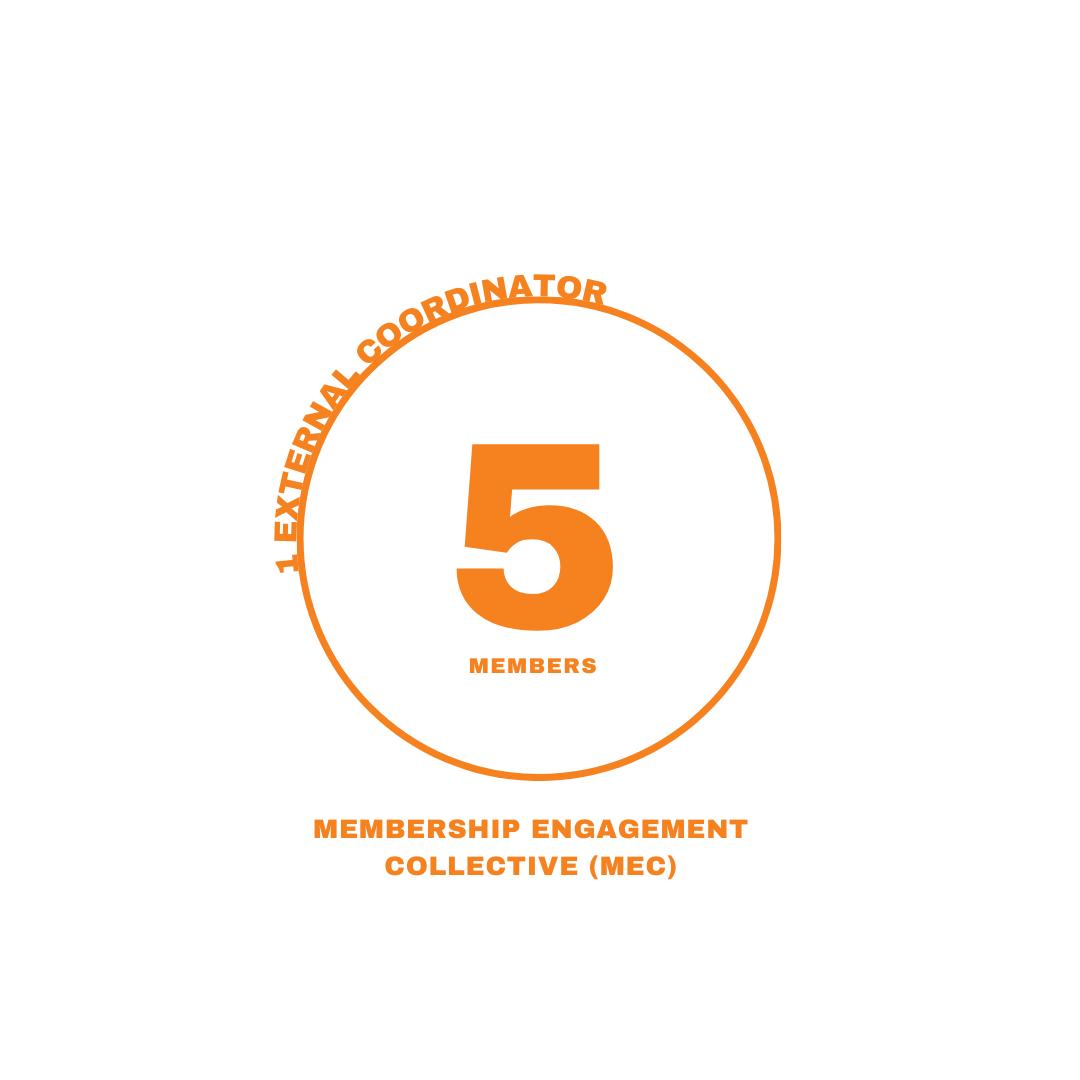
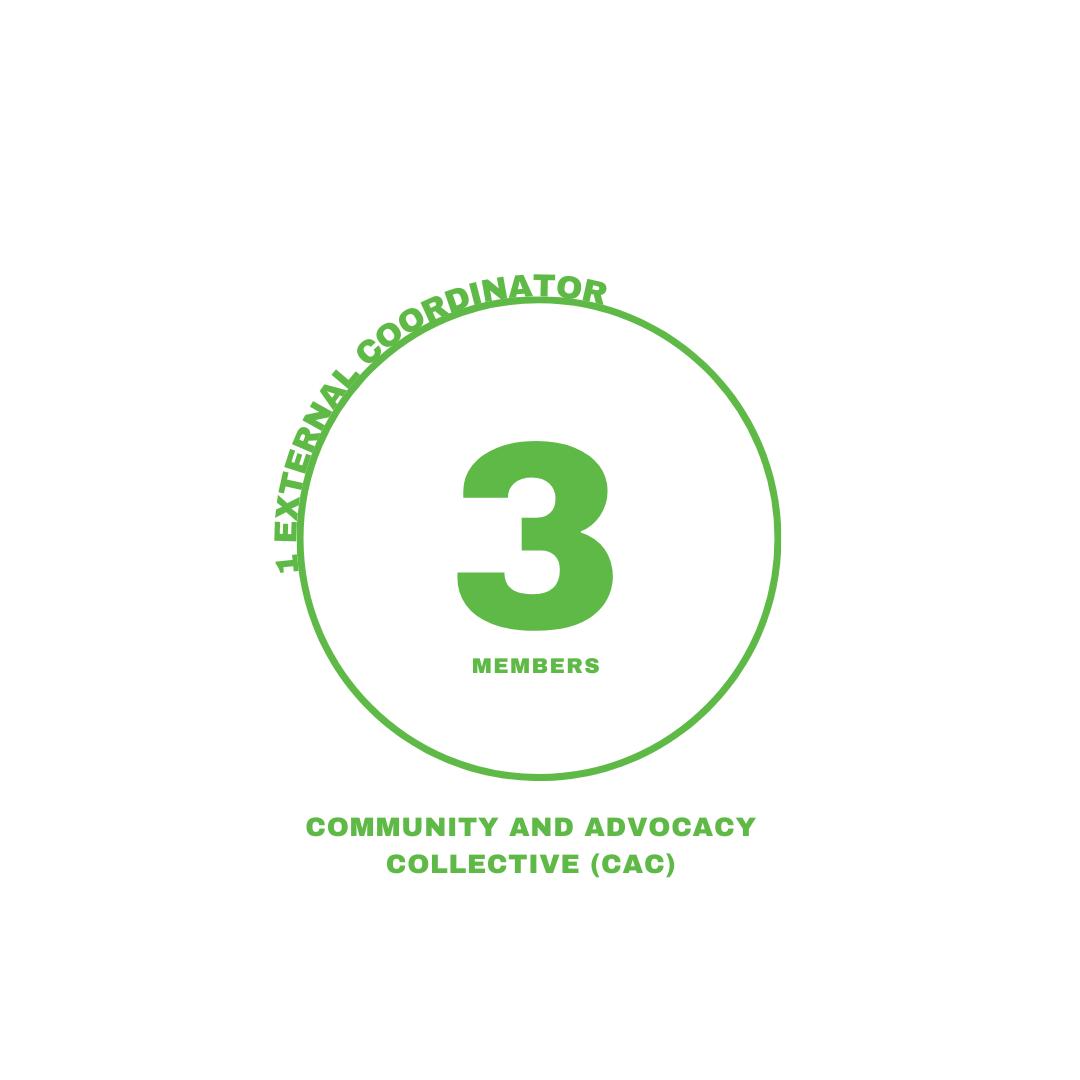
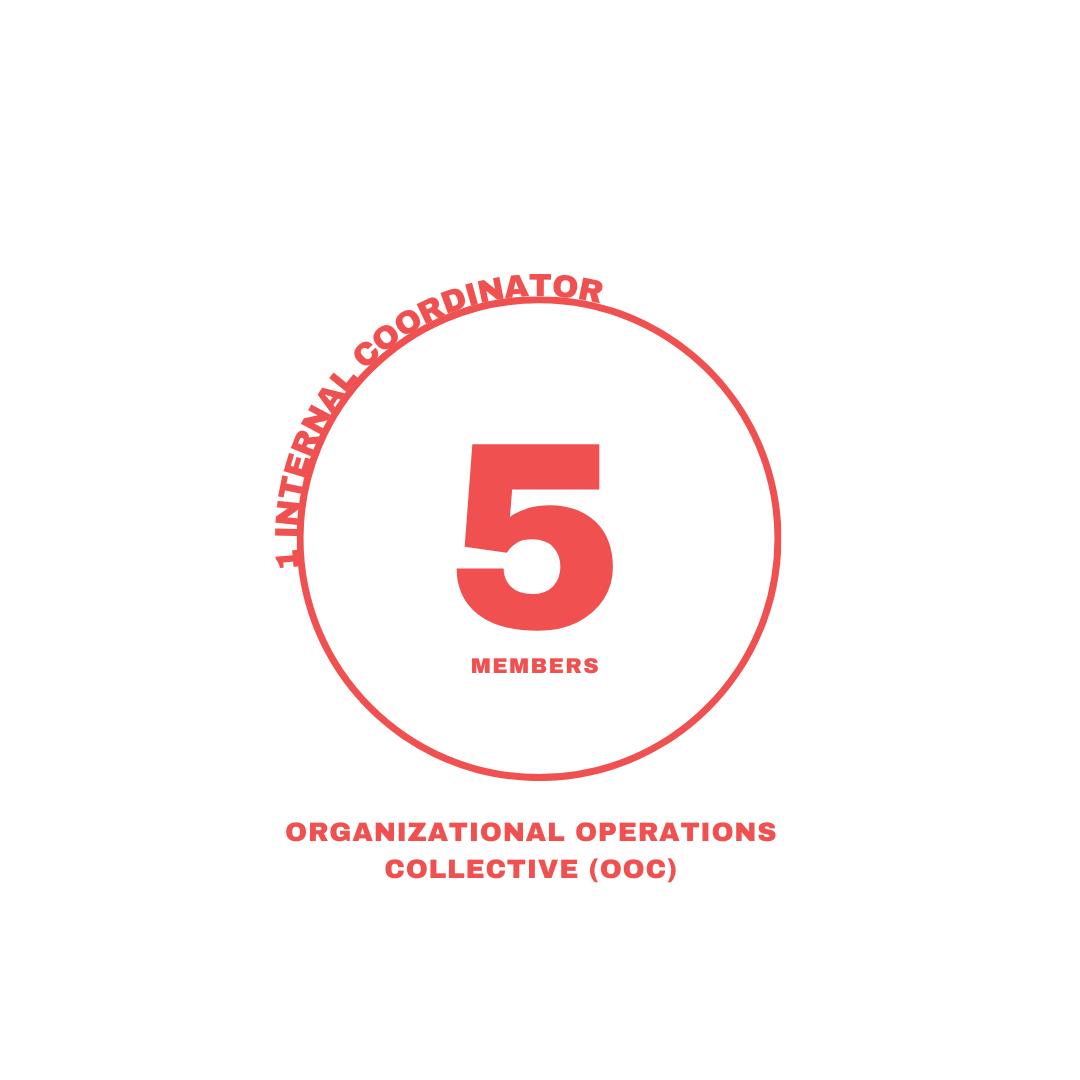

The 2022–2023 Consortium Member Needs Assessment launched on October 19, 2022 and closed on March 1, 2023. The study was designed to help the Consortium better understand our members, their needs, and their experiences as LGBTQIA2S+ resource professionals Throughout 2023, the Consortium Member Needs Assessment study team met to analyze the data, locate themes, and prepare for the study report to be launched in April 2024 The study team includes: Jesse Beal, Roman Christiaens, Andrew Herridge, Nicole Newsome, and Kristopher Oliveira
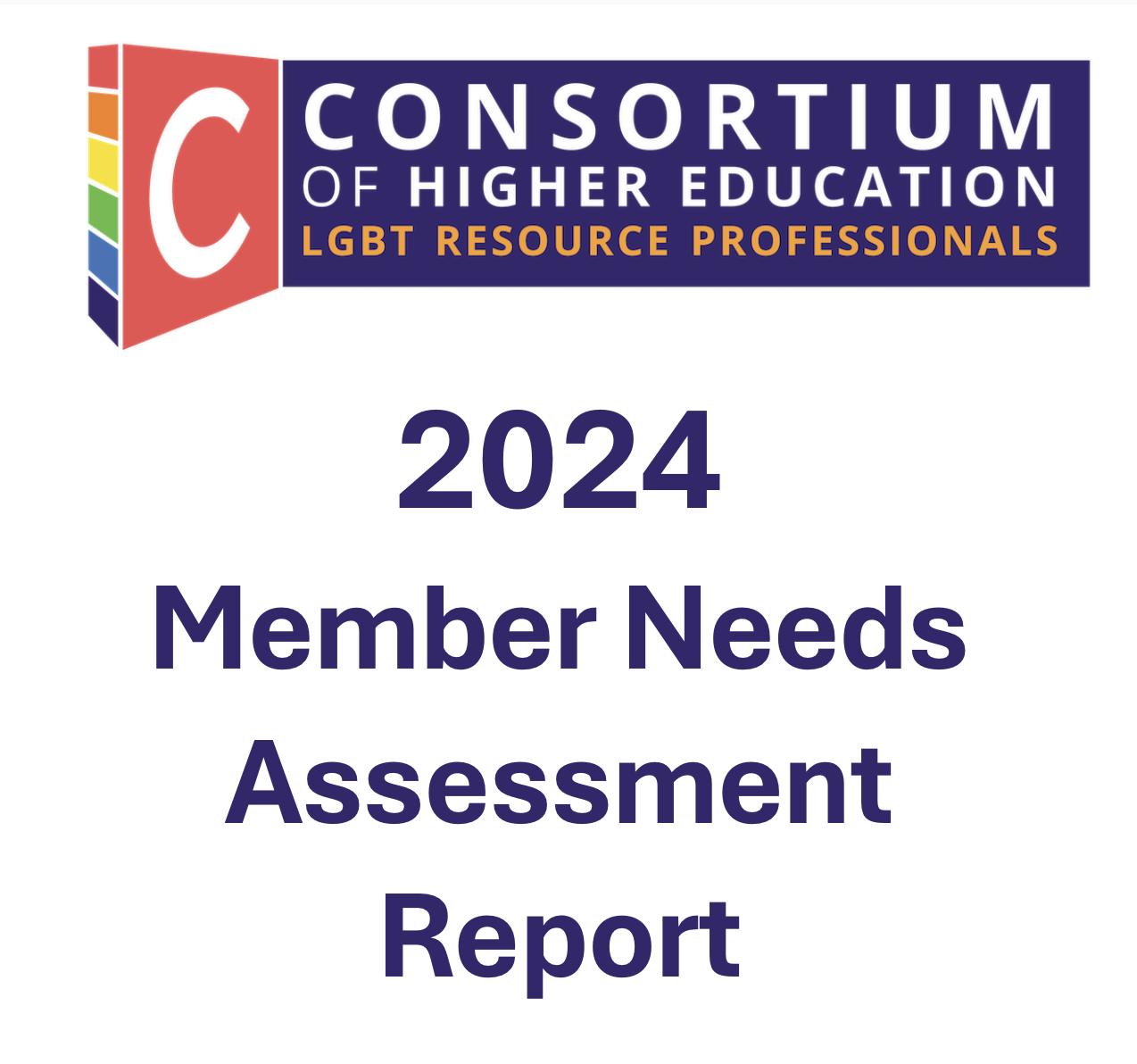
This year, we launched the new Trans Policy working group, a team of scholars and practitioners charged with updating our 2014 guidance on supporting transgender and nonbinary students. The team included authors from the 2014 document, as well as new members: Debbie Bazarsky, Jesse Beal, Genny Beemyn, Roman Christiaens, Sarah Simi Cohen, D A Dirks, Clar Gobuyan, Chris Hinesley, Chicora Martin and des velázquez The updated guidance will be issued in June 2024
In May 2023, the Consortium joined the National Center for Transgender Equality, GLSEN, the American Counselor Association, interACT: Advocates for Intersex Youth, the National Association of School Psychologists, the National Education Association, and many other organizations in response to the proposed Title IX athletics rules released by the Department of Education Trans and nonbinary students have the right to play sports We urged the Department of Education to finalize a Title IX rule that protects the right to participate in sports for students in every state in the United States
In October 2023, we released a statement on the closure of the LGBTQ+ Resource Center at the University of Houston as a result of Texas state legislature SB17, condemning state legislation in Texas and Florida as we understand them to be an attack on LGBTQ+ Centers in higher education The Consortium Board voted to designate $2,000 for the blue and green regions to support colleagues impacted by the closures We informed members that if they are in affected regions, then we would provide a complimentary membership as individuals, to ensure they can remain a part of our community Additionally, we asked members to call institutional leaders and stakeholders into action to attend our Center Awareness Day where we discussed the socio-political climate and larger legislative decisions impacting our communities We also asked that members complete a Legislative Impact Survey so we could gain a better understanding pertaining to the impacts of legislation on our work

In October 2023, we held our annual Center Awareness Day Webinar Center Awareness Day is celebrated annually on October 19th to honor, appreciate, bring awareness to, and call for the support of LGBTQ+ Resource Centers across the country This year, in light of the sociopolitical climate, our theme centered on the closures of LGBTQ+ resource centers, and highlighted the work that we must do to continue supporting resource professionals and students both in states with such legislation and without
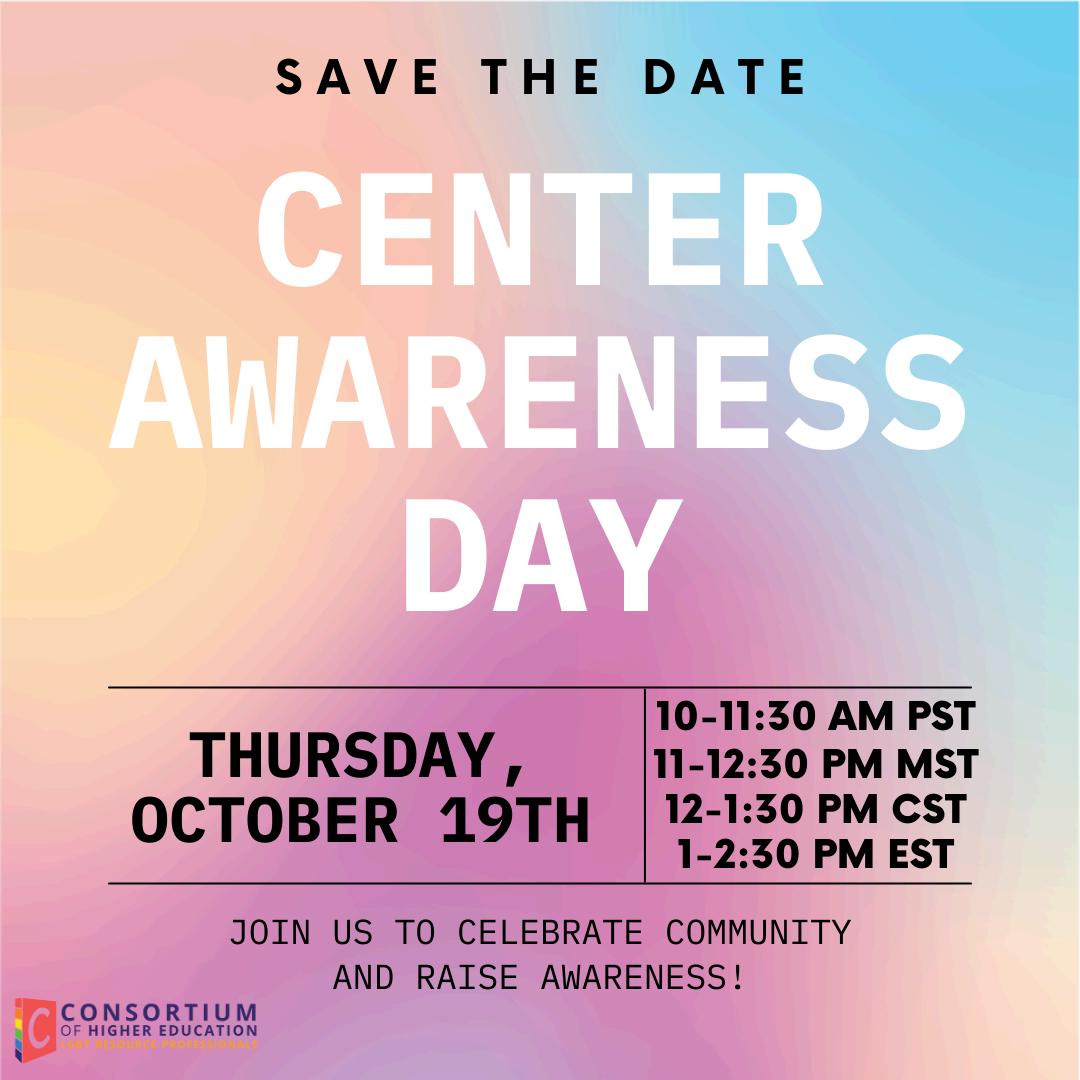
Both the Community and Advocacy Collective and the Membership Engagement Collective worked together to curate a panel of speakers and organize and promote the event. We had three panelists: Dr. Erica Freidman (Associate Director of the Pride Center, Florida International University), Jaimie Gonzales (Director of Community Relations and Events, Out in Science, Technology, Engineering & Mathematics (oSTEM)), and Dr. Aaron George (Instructor for Student Affairs and Higher Ed, Slippery Rock University). Dr. Sarah Simi Cohen was the moderator for the discussion. The questions and subsequent discussion centered around how to best support queer and trans resource professionals in states that have passed anti-DEI legislation, what the current needs are in the field, the over-compliance taking place, and coalition building between institution types and across states
We held a day-long institute at Creating Change 2023 with the theme: “Where Have We Been and Where Are We Going?” The institute covered topics on LGBTQIA2S+ equity, inclusion, justice, and belonging in educational contexts; best, better, and promising practices for serving and supporting LGBTQIA2S+ students; and how to create more inclusive and intersectional campus environments The day included:
● Campus swag swap
● History of the Consortium
● Participatory Action Research workshop
● Open Learning/Unconferencing space
● Regional break-out time
● Design thinking and freedom dreaming session
In addition to the day long institute we also hosted a number of socials and affinity spaces including:
● QTBIPOC Affinity
● Disabled/People with Disabilities Affinity
● Graduate Student Affinity
● TGQ Affinity
● Fat Folks Affinity
● Post-Institute Social
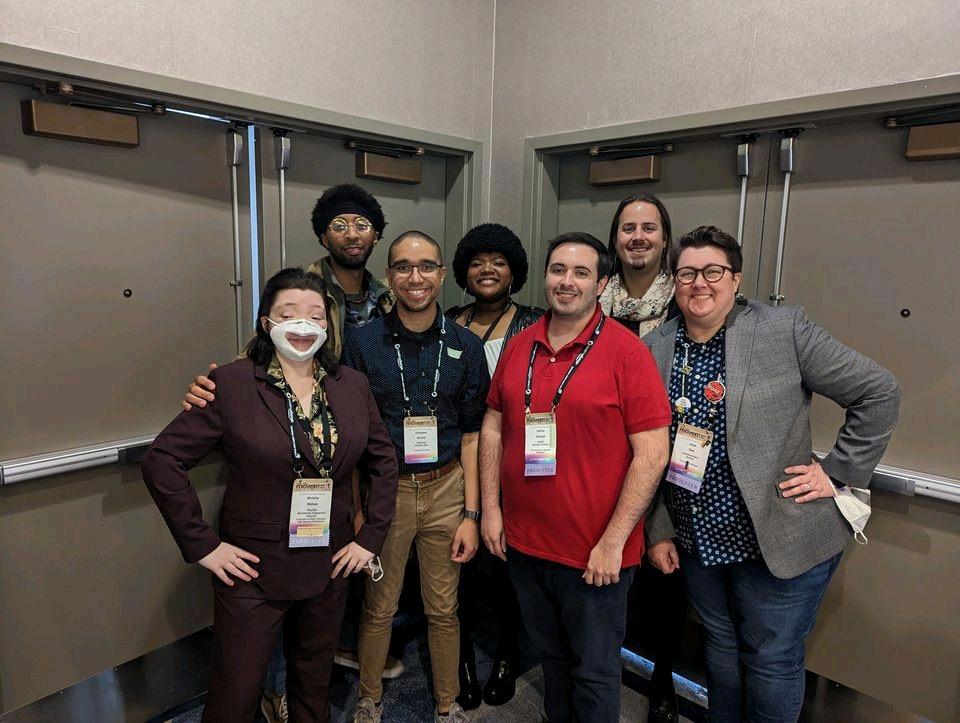

● Community Sober Social
This year’s drive in was held on April 28th, themed: Everything Is Awful: Sustaining Yourself and Your Community for the Long Haul. The featured keynote was Dr. Ronni Sanlo speaking on “The Final Lavender Graduation.” Additional sessions included the following:
● Queer Crip Survival Rituals: How Are We Sustaining Ourselves (And Each Other) for the Long HaulSR Ross
● Overcoming Public Barriers to Student Support - William Britto, Tegra Myanna, Jeff Maliskey, Sarah Peters, and Joanna Schwarts
● LGBTQIA International Students: Perceived Experiences on Academic Performance and Campus Engagement - Andrew Herridge
● E Q U I T A B L E : A Framework for Fostering Equity in LGBTQ+ Higher Education - Samantha Winterberg
● Refilling your Badass Queer Toolkit: Rest and Resources - Dacier Casanova and Rachel Simon
● Sharing Strategies for Creating and Facilitating Safe Zone Online - Kip Sorgen
● Lean into the Unknown F*8H It! (Q-BIPOC, Latine, Religious Affinity space) - Jessie Mancilla
● Building your Network of Support though Pod Mapping - Christina Chala
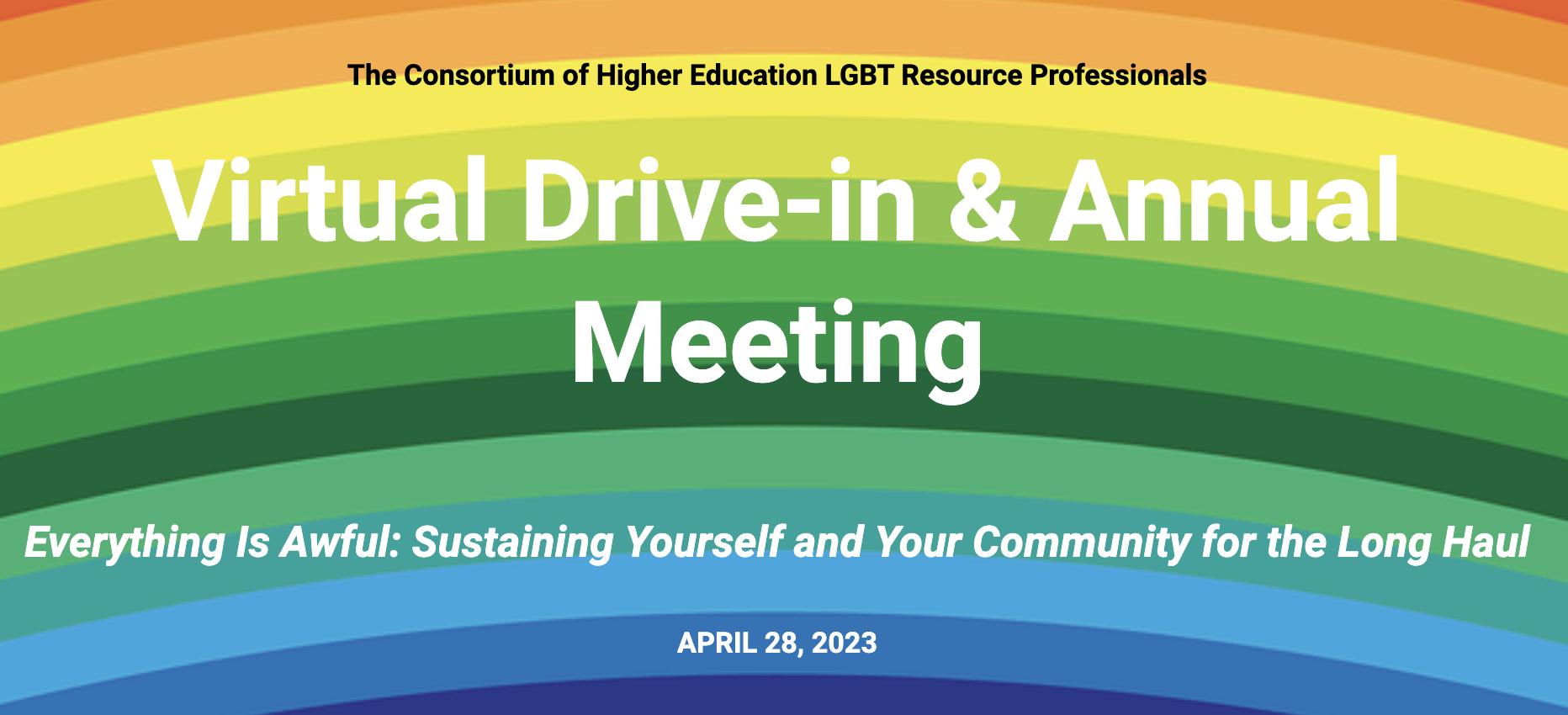
The Consortium hosted the Advisor Social at the 2023 Midwestern Bisexual Lesbian Gay Transgender Asexual College Conference (MBLGTACC) in Lexington, Kentucky. The Yellow Region representatives have historically hosted the social as an opportunity to connect with members within the region and as a recruiting opportunity for the Consortium. The 2023 Advisor Social was organized by Yellow Region Representatives Zach Parker, Chad Freeman, and Angie Freeman. Jeff
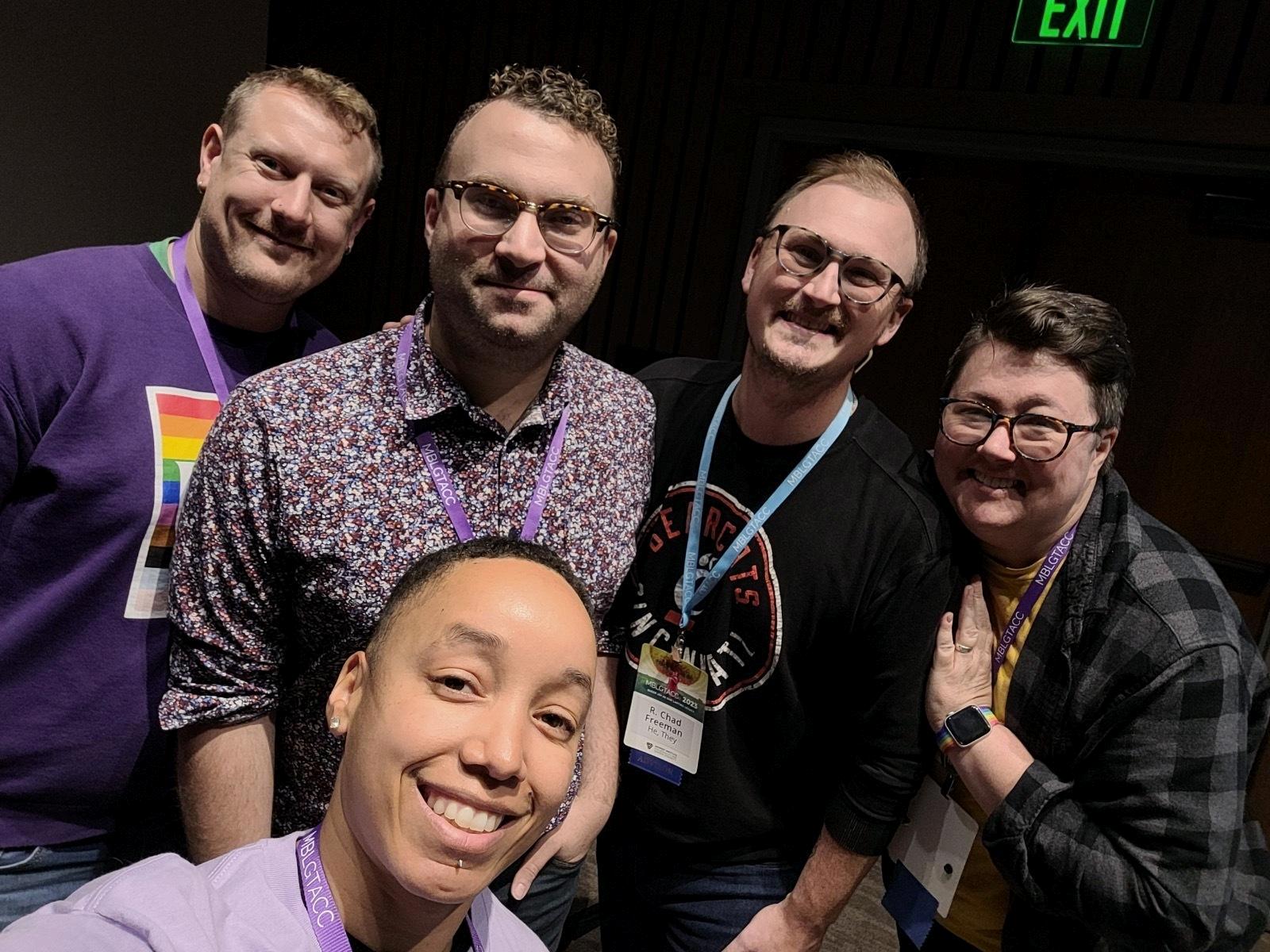

Maliskey, Advocacy and Outreach Coordinator along with Jesse Beal, Community & Advocacy Director also attended the Advisor Social The Consortium moved to add the Advisor Social at MBLGTACC as a budget line item for future engagements to support regional initiatives
In partnership with ACPA’s Coalition for Sexuality and Gender Identities (CSGI), the Consortium co-hosted a LGBTQIA2S+ resource professionals open invite brunch on Monday March 27. During the well-attended event, the Consortium and CSGI shared space for professionals already engaged in the work as well as those who are interested in LGBTQ+ affairs. The brunch served as an important space for Consortium and CSGI members to discuss collaboration and be in community together. The brunch opened up a partnership with ACPA which will continue through to the following year.
In October 2023, the Membership Engagement Collective (MEC) relaunched the Consortium’s monthly affinity calls. Previously known as constituency calls, these monthly affinity spaces are hosted by co-facilitators and provide a space for practitioners to be in community with others beyond their institutions and regions. The most recent iteration of calls include QTBIPOC, Seasoned Professionals, and Graduate Students. Each call is hosted by two co-facilitators, totaling 6 facilitators across all calls. The facilitators range from current graduate students to seasoned professionals, and hail from regions across the United States. Monthly affinity calls have been a meaningful space for connection and relationship building, and another avenue for members to relay feedback to the Consortium board Forthcoming projects include a collaborative call for trans and nonbinary practitioners with other professional organizations and strategic engagement for graduate students through affinity calls and beyond
We held a webinar on September 16 that focused on building Community Care and Disability Justice. This webinar was hosted by Michelle Wallace with panel speakers Oprah Jrenal, Hannah Soyer, and Lo Denmon and was a panel format that then opened up to questions and discussion between participants and panelists.
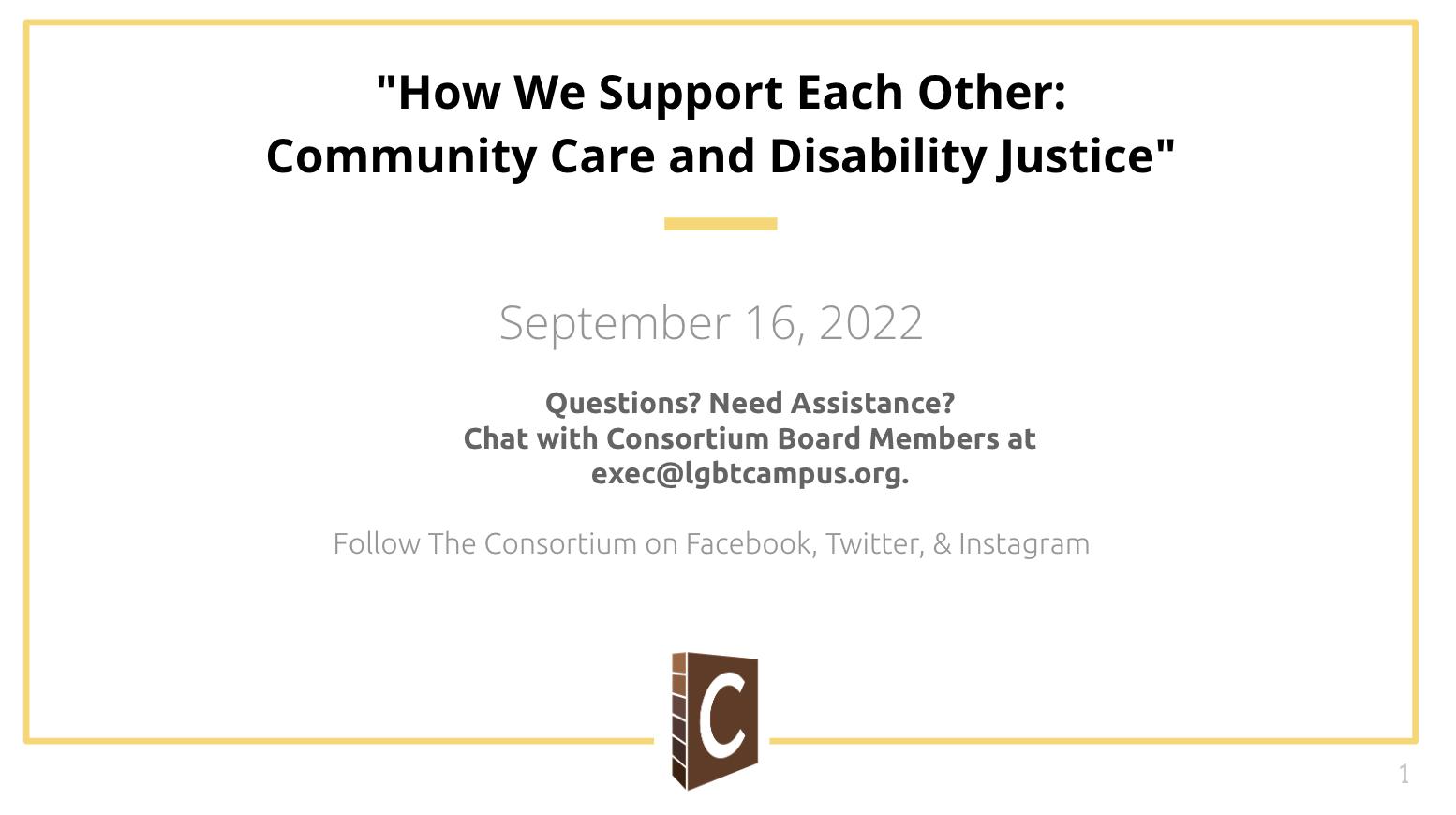
We held a webinar on July 18 that focused on building stronger support and affirming spaces for our QTBIPOC student populations. This webinar was hosted by TK Morton and Rinne-Julie in a panel format that then opened up to questions and discussion between participants and panelists

Each year, the Consortium of Higher Education LGBT Resource Professionals has the opportunity to recognize excellence in the field of LGBTQIA2S+ student services with these awards. The nominations, generated by the membership of the Consortium, lift up the amazing work of our peers and honor the individuals who create change on college campuses each day. The Consortium Awards Committee, consisting of Robby Fahrenholtz, Jeff Maliskey, Roman Christiaens and Kristopher Oliveira, awarded two nominees for the Promising New Professional Award and one nominee for the Dr. Sheltreese D. McCoy Award for Outstanding Social Justice Practice
Pronouns in Use: she/her Assistant Director, Gender and Sexuality Student Programs, Bentley University
Nanu is the first ever coordinator for Gender and Sexuality Student Programs at Bentley University in Massachusetts There work as an inaugural coordinator in a brand new center has been to create greater visibility to the LGBTQIA2S+ community, which has been largely underrepresented at at a “business-focused institution ” Her materials described a broad range of campus and community involvement opportunities and has been working to establish equitable practices across campus to improve the experiences of LGBTQIA2S+ students It’s a great honor to celebrate Nanu’s success, and we wish her continued success in her role
Pronouns in Use: they/them Program Coordinator, Center for Sexuality and Gender Diversity, University of Kansas
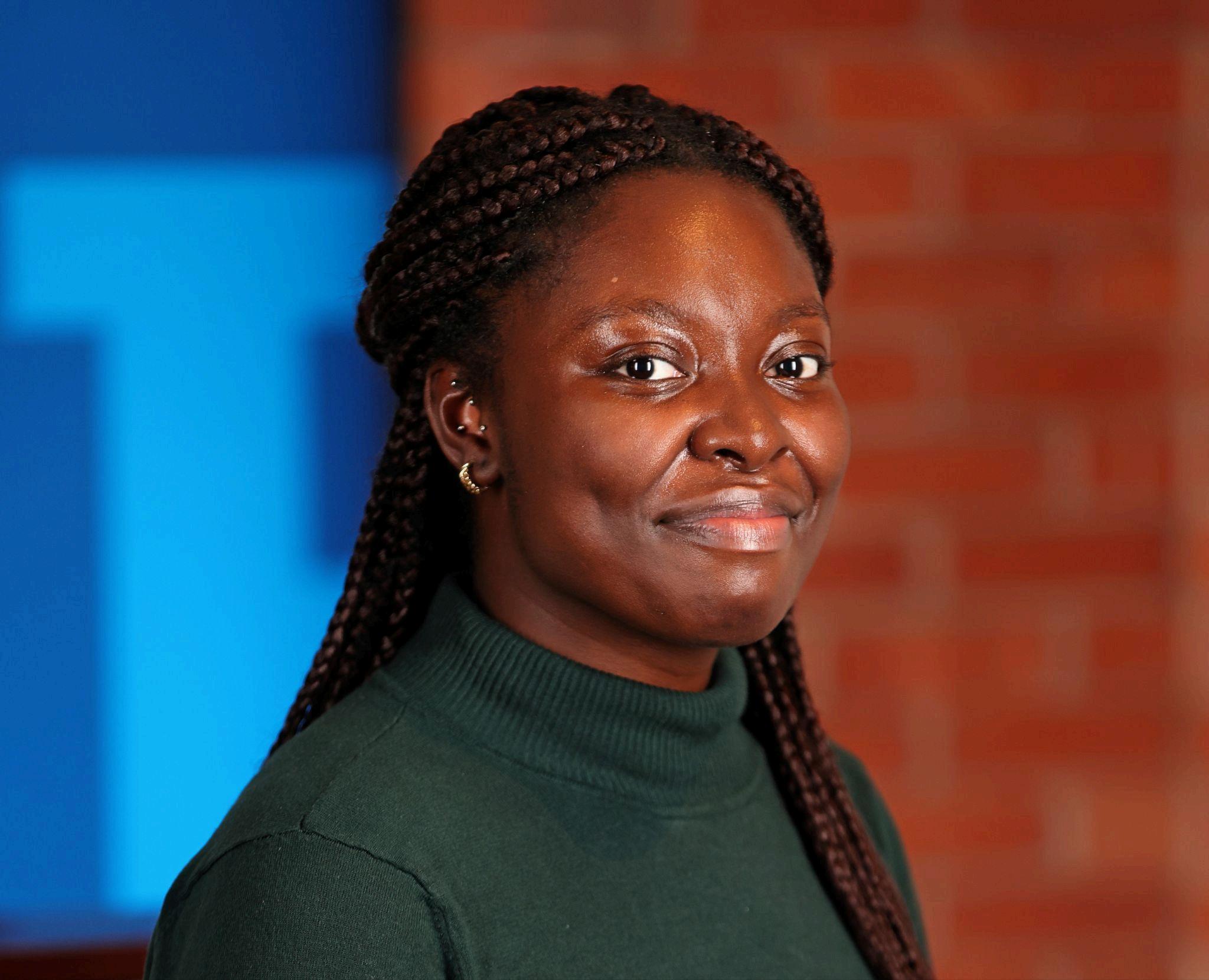
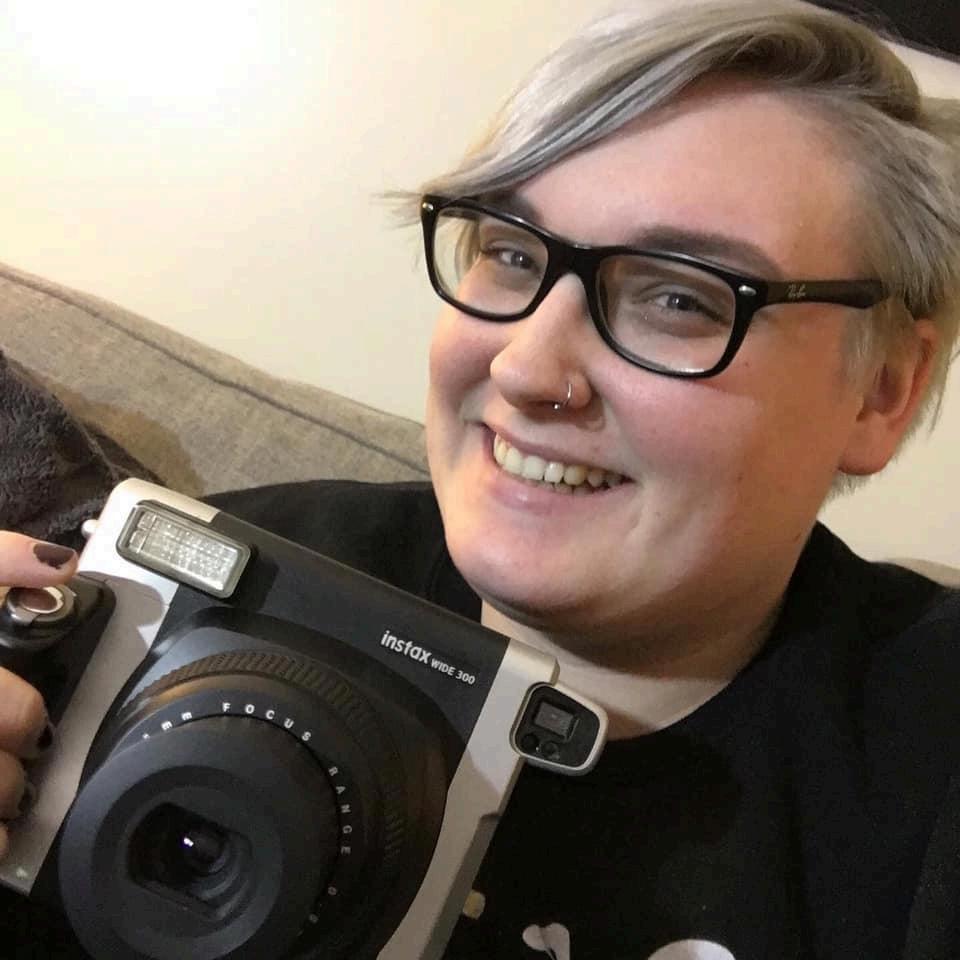
Cori Deming came into their role in the summer of 2022 and immediately began supporting students and planning innovative campus programs. Cori centers their work through joy and authenticity, and the authentic connection they make with students has translated to students seeking them out in times of crisis. Cori has demonstrated their ability to support LGBTQIA2S+ students in a variety of ways. Through their intersectional approach, individualized support, engaging events, and authenticity, they have become a staple to the Center at the University of Kansas. Congratulations on your success, Cori, we are grateful for the work you do for our communities

Pronouns in Use: he, him, él LGBTQ+ Coordinator, LGBTQ+ Resource Center, University of Colorado Colorado Springs
Rafael has demonstrated his commitment to social justice and creating a culture of belonging Within his role as the LGBTQ+ Coordinator, Rafael completely redesigned the SafeZone program and transformed Trans Day of Remembrance (TDOR) programming on campus. Rafel is a champion for student persistence and retention, advising multiple LGBTQIA2S+ student groups and creating programming and support for queer trans two-spirit and students of color. Rafael also strengthened partnerships within the community through work with a LGBTQIA2S+ youth services organization and an organization that provides healing for survivors of various traumas. Rafael is an excellent candidate for the Dr. Sheltreese D. McCoy Award for Outstanding Social Justice Practice due to his commitment to collaboration, elevating emerging scholars, and creating an intentional culture of belonging that extends beyond the campus community
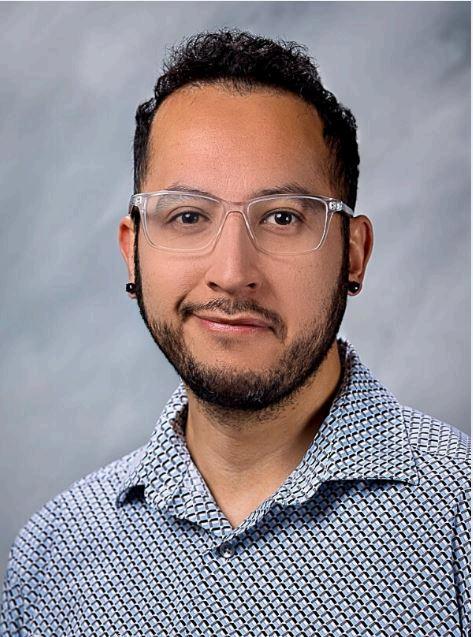
One of the primary changes regarding the organization's financial status included a partnership with Revolutions Bookkeepers, a bookkeeping company located in Austin, TX and committed to social justice The partnership with Revolutions has been pivotal in providing streamlined services regarding the 501c3 nonprofit’s budget, bookkeeping and taxes Given our positive experience with Revolutions and Katie Helm, the founder, the Consortium will continue to work with Revolutions Bookkeepers regarding financial support
As for the financial status, the Consortium continues to have a healthy amount of assets, despite the financial challenges of the ongoing pandemic. Similar to previous years, the primary expenses of our organization include web/tech expenses, honorariums for speakers, stipends for Board and Region Rep positions, and Creating Change. Our primary sources of income continue to be membership fees and MemberClicks revenue from the Consortium’s job board and webinar engagement.
Lo Denmon (Taxes and Finances Coordinator)

The Consortium consists of eight different regions that span the United States and some parts of Canada. Each region has representatives who work to ensure that institutions in their respective states have access to continuing professional development, education, advocacy, and support resources.
I want to celebrate Zach Parker and Chad Freeman who have both completed two terms as the region representatives for the Yellow Region. They have both been very active with the Consortium and providing support to the Yellow Region
Looking at the past year, the Region Representatives have been active among the various Consortium programs and hosting their own events within their regions Each regional representative served on one of three committees within the Consortium These included Webinars, Affinity Calls, and the Virtual Drive-In committees This year, the Consortium was a sponsor for MBLGTACC Being held in Kentucky, the Yellow and Green Regional Representatives hosted an advisory social, roundtable and drag show at the conference A summary of the events can be found on the linked flier (LINK)

Within the Pink Region, a monthly coffee hour was held on Zoom to provide a space for anyone who wanted to be in community with others
If you have any questions, please do not hesitate to contact your regional representative or myself. I look forward to working with our outstanding group of regional representatives and focusing on creating lasting and sustaining connections in the Consortium Regions!
Andrew S. Herridge, Ph.D. (Regions Coordinator)
Blue Region: Arkansas, Arizona, Louisiana, New Mexico, Oklahoma, Texas
● Vacant

Green Region: Alabama, Florida, Georgia, Kentucky, Mississippi, North Carolina, South Carolina, Tennessee, Virginia, West Virginia
● Michael Nunes, University of Central Florida
Orange Region: Delaware, Maryland, New Jersey, New York, Pennsylvania, Washington DC
● Lyosha Gorshkov, Colgate University
● Robby Fahrenholtz, Adelphi University
Pink Region: Alaska, Alberta, British Columbia, Colorado, Denver, Idaho, Montana, Oregon, Utah, Washington, Wyoming
● Rachel Freeman-Cohen, San Diego State University
Purple Region: California, Hawaii, Nevada
● Robert Powers, College Torch
Red Region: Connecticut, Maine, Massachusetts, New Brunswick, New Hampshire, Rhode Island, Vermont
● Xiomara Giordano, Bennington College
Yellow Region: Illinois, Indiana, Iowa, Kansas, Michigan, Minnesota, Missouri, Nebraska, North Dakota, Ohio, Ontario, South Dakota, Wisconsin
● Angie Freeman, University of Michigan
● Zach Parker, University of Missouri, Kansas City
● Chad Freeman, University of Cincinnati

During the upcoming year, the Consortium Collectives plan to forward the following quarterly goals:
● MEC
○ Host our annual virtual drive-in conference
○ Increase community building by developing our affinity calls
○ Create webears based on member feedback including topics of understanding departmental budget and fundraising
● CAC
○ Lead the ACPA Pre-Convention Planning Team
○ Release of the Consortium Member Needs Assessment and the updated guidance for supporting trans and nonbinary people in higher education
● OOC
○ Support the financial transition for the new Internal Relations Director and increase PNC authorized signers with our bank account
○ Run elections for new Executive Board members and Region Rep positions
Additionally, the Directors plan to:
● Onboard our new Internal Relations Director
● Strengthen our partnership with ACPA, including hosting our Pre-Convention Workshop and practitioner brunch at the annual convention
● Help to organize and plan for the summer 2024 Board Retreat
